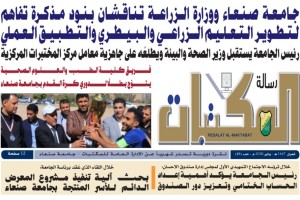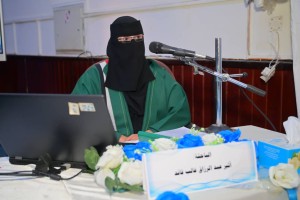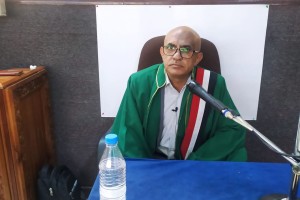Master’s Degree Awarded to Researcher Murad Ghaylan
- Categories Letters and Promotions - Graduate Studies, news, Regulations - Postgraduate Studies
- Date January 25, 2025

Researcher Murad Mohammed Abdul Jalil Ghaylan has been awarded a Master’s degree with distinction in Gender and International Development from the Inclusive Development Research Center at Sana’a University. His thesis is titled “The role of non-governmental organizations in building the capacities of workers to enhance humanitarian work in Yemen” and the defense took place on Wednesday, 15/07/1446 AH, corresponding to January 15, 2025.
The discussion and evaluation committee consisted of: Prof. Dr. Mohammed Abdullah Hamid, external examiner and chair of the committee; Assoc. Prof. Dr. Ilham Mohammed Al-Rida, supervisor and committee member; and Dr. Mamoun Ali Aqlan Abdul Safi, internal examiner and committee member.
The thesis aimed to identify the role of non-governmental organizations in building the capacities of workers to enhance humanitarian work in Yemen.
The study revealed several findings, including a statistically significant positive impact of capacity building on enhancing humanitarian work among workers in non-governmental organizations operating in Yemen, with a t-value of (2.42), which is statistically significant at a significance level of (0.000). The beta value of (0.73) indicates a moderate reflection of capacity building on enhancing humanitarian work among workers in these organizations.
Furthermore, the results showed that capacity building for humanitarian work in non-governmental organizations faces numerous challenges, the most prominent of which are the lack of necessary infrastructure for training and qualifying workers, a shortage of reward systems, and weak training programs offered by organizations. The strategies used for building the capacities of workers in non-governmental organizations in Yemen were found to be moderate, with a high level of challenges confronting these organizations.
In his thesis, the researcher provided several recommendations, the most notable of which is that non-governmental organizations need to establish policies that support social justice in all aspects of capacity building, such as offering equitable training programs and encouraging women to engage in technical and administrative fields. These policies should be supported by executive measures to ensure their implementation. Additionally, there is a need to enhance the strategies used for building the capacities of workers in non-profit organizations involved in humanitarian work in Yemen. International and local NGOs in Yemen still require the development of strategies for capacity building and enhancing the skills of humanitarian workers.
The study also recommends conducting future research in the field of humanitarian work and evaluating the performance of humanitarian workers over specific time periods to assess their development and identify capacity-building needs. It emphasizes measuring the impact of interventions and training programs on worker performance, providing training and development opportunities to improve the skills of humanitarian workers, and increasing their ability to manage workloads and tasks more effectively. Furthermore, it advocates for improving the availability of necessary tools and equipment to facilitate tasks efficiently, thereby fostering creativity and enhancing productivity among humanitarian workers in local and international NGOs.
The discussion was attended by numerous academics, researchers, students, and interested individuals, along with several colleagues and family members of the researcher.
Discover more from Sana'a University
Subscribe to get the latest posts sent to your email.






